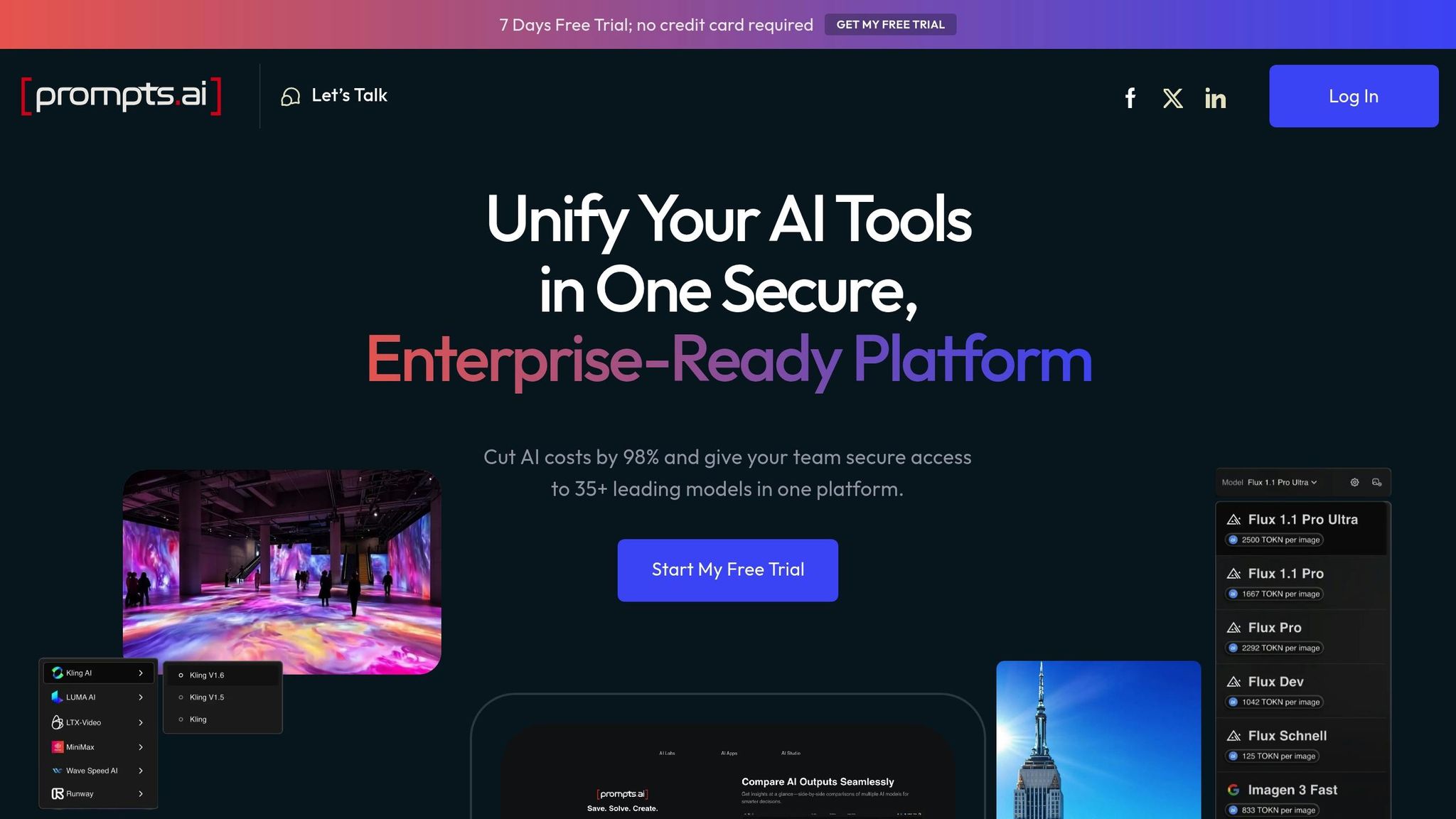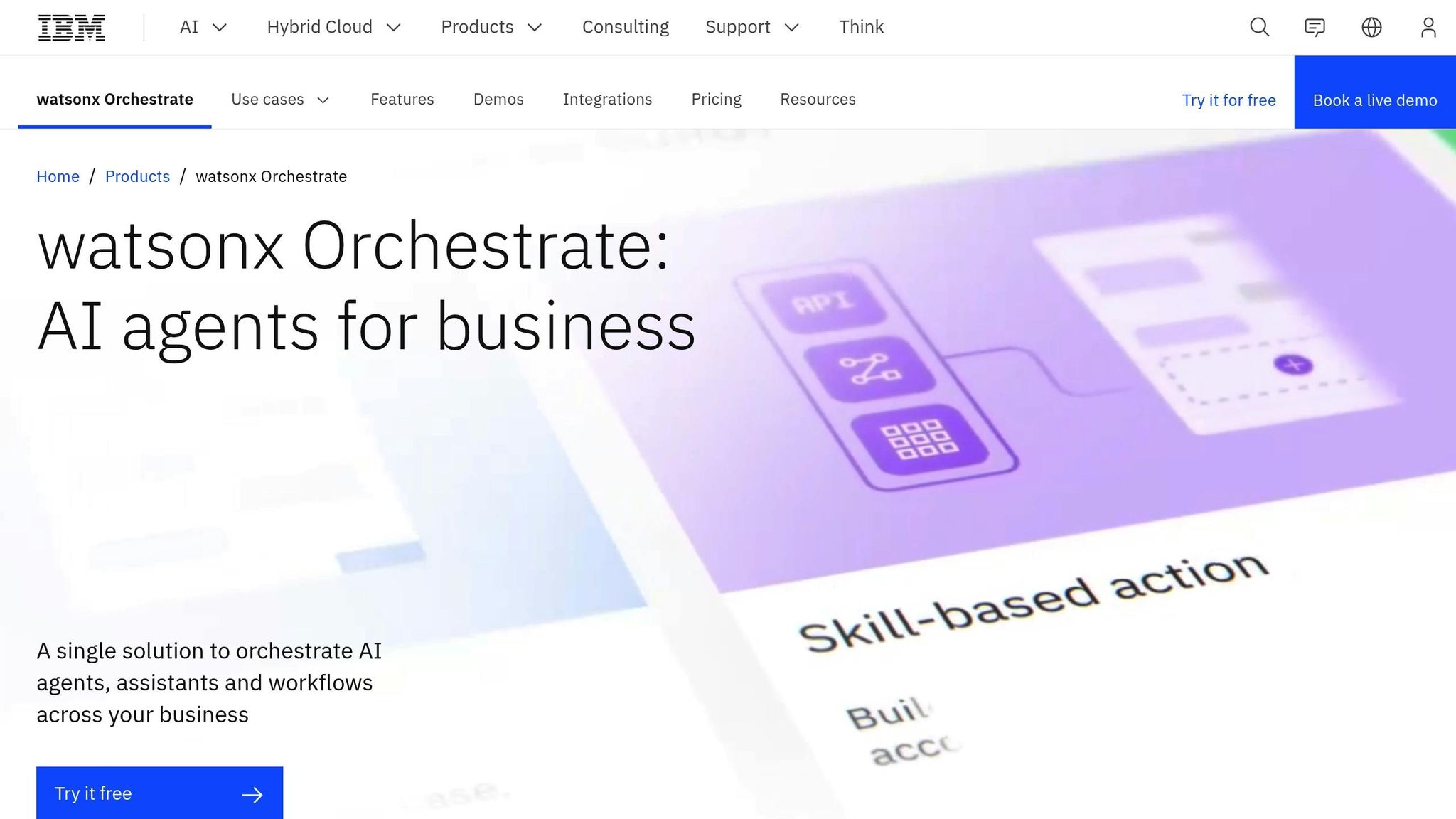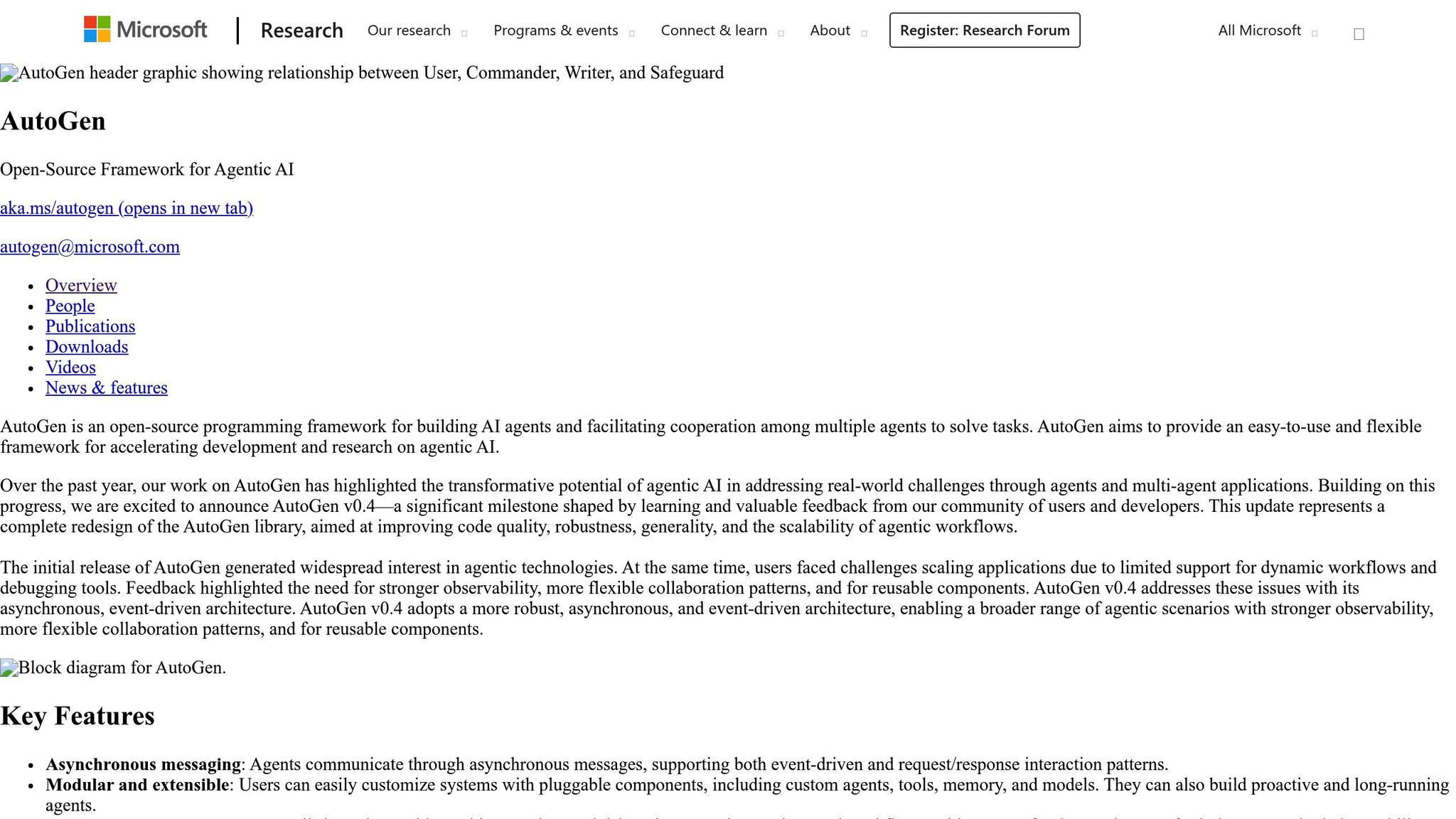
In today’s fast-paced AI landscape, managing multiple tools and ensuring secure workflows can be overwhelming. Secure model orchestration platforms simplify this by centralizing AI tools, improving governance, and reducing costs. This article evaluates three top platforms - Prompts.ai, IBM Watson Orchestrate, and Microsoft AutoGen - based on security, compliance, interoperability, and scalability.
| Platform | Security Features | Compliance Tools | Integration Strengths | Scalability Focus | Best For |
|---|---|---|---|---|---|
| Prompts.ai | Enterprise-grade encryption, audit logs | Built-in monitoring | Slack, Gmail, Trello | Cost-efficient, multi-model workflows | Cost-conscious teams prioritizing governance |
| IBM Watson Orchestrate | AES-256 encryption, TLS for data | Deep regulatory compliance | IBM Cloud ecosystem | Customizable enterprise solutions | Regulated industries needing compliance |
| Microsoft AutoGen | Secure multi-agent architecture | Limited compliance tools | Azure and cross-language | Large-scale deployments | Enterprises using Microsoft tools |
Each platform caters to unique organizational needs, whether cost savings, regulatory compliance, or advanced AI capabilities. The right choice depends on your priorities and infrastructure.


Prompts.ai simplifies the complex world of AI model management by focusing on security, scalability, and seamless orchestration. Acting as a centralized AI orchestration platform, it brings together over 35 leading AI models - including GPT-4, Claude, LLaMA, and Gemini - into one user-friendly interface. By addressing the issue of fragmented AI tools, Prompts.ai allows organizations to streamline workflows while maintaining top-tier security and compliance.
Prompts.ai prioritizes data protection with enterprise-grade security measures and strict access controls. These features safeguard sensitive information and ensure that AI interactions are secure. The platform’s governance tools enable administrators to set permissions and monitor AI usage across teams.
"Unify Your AI Tools in One Secure, Enterprise-Ready Platform"
With detailed visibility and auditability, the platform generates logs for every AI interaction. This ensures organizations can oversee activity, identify vulnerabilities, and address unauthorized access swiftly. These governance tools are available across all subscription tiers, reinforcing the platform’s dedication to security.
Prompts.ai includes built-in compliance monitoring to help organizations meet regulatory and internal governance standards. Business-tier plans feature logging capabilities that track every AI interaction, ensuring adherence to reporting requirements.
One of the standout features of Prompts.ai is its ability to integrate seamlessly with popular enterprise tools like Slack, Gmail, and Trello. This workflow integration transforms isolated AI tasks into automated, repeatable processes that align with existing business operations. The feature, available in Core ($99 per member/month), Pro ($119 per member/month), and Elite ($129 per member/month) plans, allows users to orchestrate multiple AI tools and models simultaneously, enabling easy comparison of results.
A practical example of this integration comes from May 2025, when Johannes V., a Freelance AI Director, used Prompts.ai to coordinate various AI tools for a promotional video project. His toolkit included Midjourney V7, Google DeepMind ImageFX, Flux 1, Kling AI, Luma AI, and Google DeepMind Veo2. He highlighted how Prompts.ai enabled him to use Google DeepMind Veo2 "to integrate smooth and immersive animations".
These integrations not only enhance workflows but also support scalable AI operations.
Prompts.ai is designed to grow alongside an organization’s needs. By unifying AI model orchestration, the platform simplifies scaling across departments and use cases without disrupting workflows. This adaptability is crucial for enterprises experiencing rapid AI adoption, ensuring that security, performance, and compliance remain intact as operations expand.
"Discover how top enterprises, creative teams, and academic institutions use prompts.ai to deploy secure, compliant AI workflows saving time, cutting costs, and driving real results."

IBM Watson Orchestrate employs AES-256 encryption to ensure the protection of sensitive data during AI model orchestration.
To safeguard information, IBM Watson Orchestrate encrypts data at rest using Advanced Encryption Standard (AES-256). Additionally, all IBM Cloud database instances come with default encryption enabled. For data in transit, the platform relies on TLS encryption to maintain secure communication channels.

Microsoft AutoGen is a multi-agent AI platform designed to support scalable and collaborative systems. With version 0.4, the platform introduced a restructured architecture aimed at improving secure orchestration in distributed environments.
AutoGen prioritizes security through a robust enterprise-focused architecture. It ensures secure deployments across major cloud platforms like OpenAI and Azure, safeguarding sensitive data during multi-agent interactions. By employing an actor model, each agent independently manages its state and communicates exclusively through predefined channels, maintaining secure and controlled interactions.
This strong security framework underpins the platform’s ability to scale effectively.
The platform’s asynchronous, event-driven architecture ensures efficient and scalable multi-agent deployments.
"Microsoft's version represents a fundamental redesign focusing on enterprise-grade scalability, observability, and cross-language support."
– Prateek Dwivedi, AI & Analytics Executive
Key modular components, such as the GrpcWorkerAgentRuntime extension, enable large-scale distributed deployments. This architecture allows businesses to scale their AI operations without requiring a proportional increase in infrastructure investment.
"AutoGen isn't just a research toy - it's enterprise-ready, supporting large-scale deployments with OpenAI, Azure, and other cloud platforms. This makes it a strong contender for companies looking to build AI-driven customer service, data analysis, or automation solutions at scale."
– Khushbu Shah, ProjectPro
With its agent-centric design, AutoGen simplifies multi-agent communication and task decomposition, seamlessly integrating into existing AI workflows and cloud platforms. Its cross-language support further enhances compatibility, enabling organizations to incorporate advanced multi-agent capabilities into their current systems.
Every platform brings its own set of benefits and challenges when it comes to secure AI model orchestration. Here's a closer look at what each offers and where they might fall short.
Prompts.ai stands out for its ability to slash costs by up to 98% through its pay-as-you-go TOKN credit system. It consolidates access to over 35 AI models, reducing tool sprawl while maintaining enterprise-level governance. With a built-in FinOps layer for real-time cost tracking and optimization, it’s a go-to choice for organizations focused on cost efficiency and operational simplicity.
IBM Watson Orchestrate leverages IBM's extensive enterprise expertise, offering robust security, compliance, and integration with IBM Cloud. The platform supports deep customization and includes professional services, making it a strong candidate for industries like healthcare and finance that demand strict regulatory compliance. However, its higher costs and complexity might deter smaller organizations, and its reliance on IBM's ecosystem could limit multi-cloud flexibility.
Microsoft AutoGen shines with its multi-agent architecture, built for scalability through an asynchronous, event-driven design. Its seamless Azure integration and cross-language support provide developers with the flexibility needed for large-scale deployments. On the downside, implementing its multi-agent framework often requires specialized expertise, and organizations outside the Microsoft ecosystem may encounter integration challenges and a steeper learning curve.
These strengths and challenges align with the critical factors of security, compliance, interoperability, and scalability.
| Platform | Key Strengths | Primary Limitations | Best For |
|---|---|---|---|
| Prompts.ai | Cost savings up to 98%, access to 35+ models, real-time FinOps, strong governance | – | Organizations prioritizing cost-efficient, multi-model orchestration with strong governance |
| IBM Watson Orchestrate | Robust compliance, deep enterprise expertise, extensive customization, professional support | Higher costs, complexity, potential vendor lock-in | Highly regulated industries needing comprehensive security and customization |
| Microsoft AutoGen | Scalable multi-agent design, Azure integration, cross-language support | Complex implementation, dependency on Microsoft ecosystem, steep learning curve | Enterprises using Microsoft tools, seeking advanced multi-agent capabilities |
The choice of platform depends on organizational needs. Companies prioritizing cost control and simplified governance may lean toward Prompts.ai. Those requiring extensive customization and strict compliance might prefer IBM Watson Orchestrate. Meanwhile, enterprises already invested in Microsoft’s ecosystem and aiming for advanced multi-agent solutions could find Microsoft AutoGen a strong contender, despite its complexities.
Selecting the best AI orchestration platform comes down to your organization’s unique priorities and infrastructure. The right choice will depend on what matters most - whether it’s cost savings, regulatory compliance, or technical capabilities.
For cost-conscious organizations seeking broad access to AI models, Prompts.ai stands out. By using a pay-as-you-go TOKN credit system, it can slash AI-related expenses by up to 98%, eliminating the need to juggle multiple subscriptions. With access to over 35 leading models - including GPT-4, Claude, LLaMA, and Gemini - it empowers teams to experiment freely and deploy solutions without vendor lock-in. Additionally, its built-in FinOps layer offers real-time cost tracking, a crucial tool as AI spending continues to rise. This makes Prompts.ai an excellent choice for organizations moving from casual AI experimentation to structured, well-governed workflows.
For organizations operating in highly regulated industries, IBM Watson Orchestrate may be a better fit. Designed with compliance and enterprise requirements in mind, it provides customizable workflows and professional support to meet stringent regulatory standards. However, its implementation process may require more time and effort compared to other platforms.
Similarly, enterprises deeply integrated with Microsoft’s ecosystem might consider Microsoft AutoGen. Its asynchronous, event-driven architecture and seamless Azure compatibility make it ideal for large-scale deployments. However, taking full advantage of its advanced multi-agent framework often demands specialized technical expertise, which could be a consideration for less technically equipped teams.
Ultimately, your decision should align with your budget, regulatory requirements, and technical capabilities. For those prioritizing cost efficiency and governance, Prompts.ai offers a compelling solution. Meanwhile, organizations with strict compliance needs or a preference for ecosystem integration may find platforms like IBM Watson Orchestrate or Microsoft AutoGen more suitable. Starting with a pilot program can help ensure the platform you choose fits seamlessly into your operations.
Prompts.ai places a strong emphasis on data security and regulatory compliance, providing a single platform to streamline and protect AI workflows. With advanced measures like centralized control and secure prompt engineering, it shields sensitive data and minimizes risks of unintended AI actions.
By combining large language models with stringent security protocols, Prompts.ai safeguards your systems against misuse while meeting industry data protection standards. This commitment reinforces trust and ensures reliability in your AI-powered initiatives.
IBM Watson Orchestrate is built for scalability, leveraging a microservices-based architecture that allows for flexible deployments and smooth integration with enterprise tools such as Salesforce, SAP, and Microsoft 365. Its support for multi-agent orchestration makes it a strong choice for handling complex workflows across various platforms.
In contrast, Microsoft AutoGen is optimized for seamless integration within the Microsoft ecosystem. It shines when it comes to interoperability with tools like Teams, Word, and Excel, focusing on boosting collaboration and productivity in Microsoft-centric setups. However, IBM Watson Orchestrate stands out with its broader third-party compatibility and adaptability, making it better suited for enterprises looking to scale and diversify their operations.
Prompts.ai stands out as a smart choice for budget-conscious organizations, offering a solution that slashes expenses through its pay-per-use TOKN credits system, potentially reducing costs by up to 98%. By bringing all essential features into a single platform, it eliminates the hassle and expense of juggling multiple subscriptions, saving both time and resources.
Its optimized prompt routing further trims operational costs by as much as 40%, ensuring AI workflows are managed efficiently and economically. Designed with seamless integration, scalability, and security in mind, Prompts.ai delivers a cost-effective approach without sacrificing performance or reliability.


